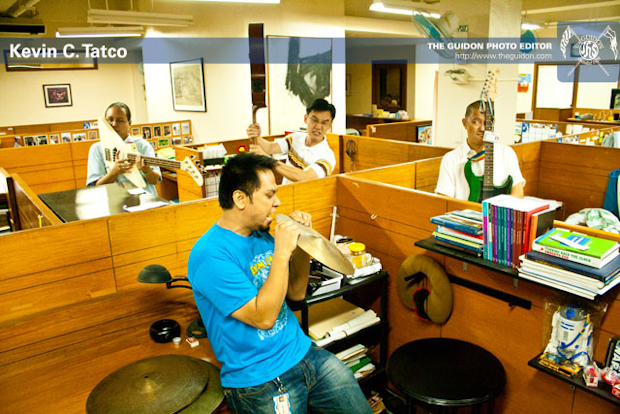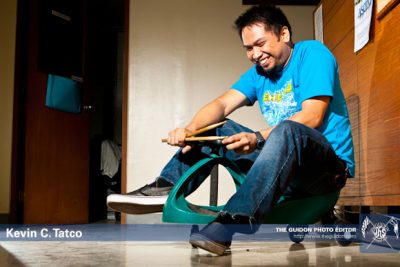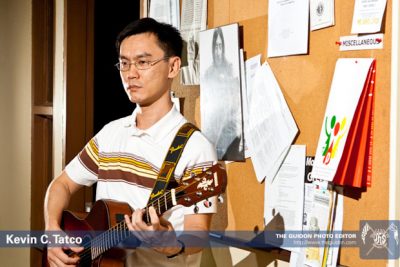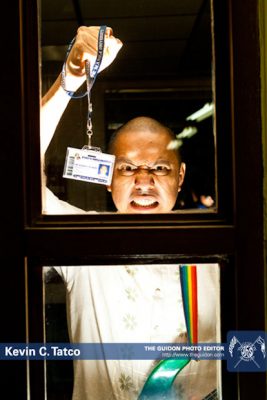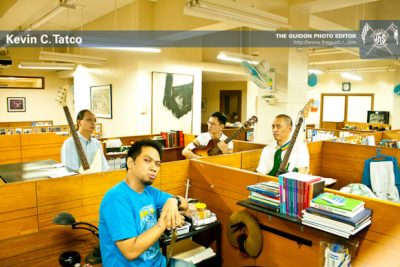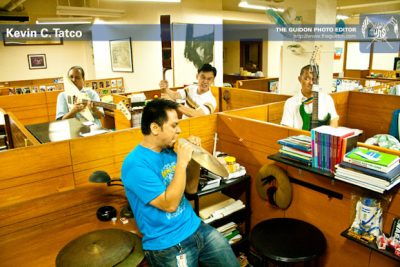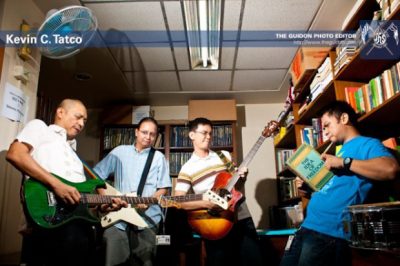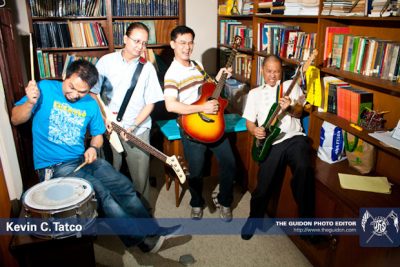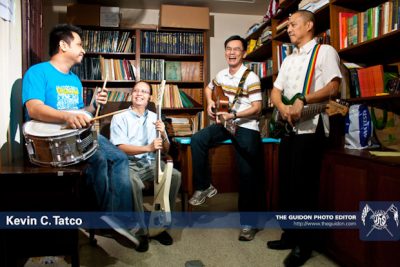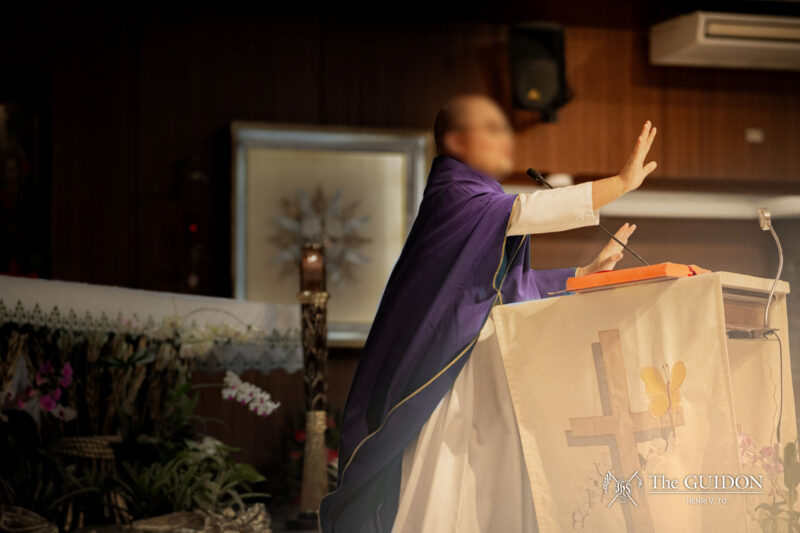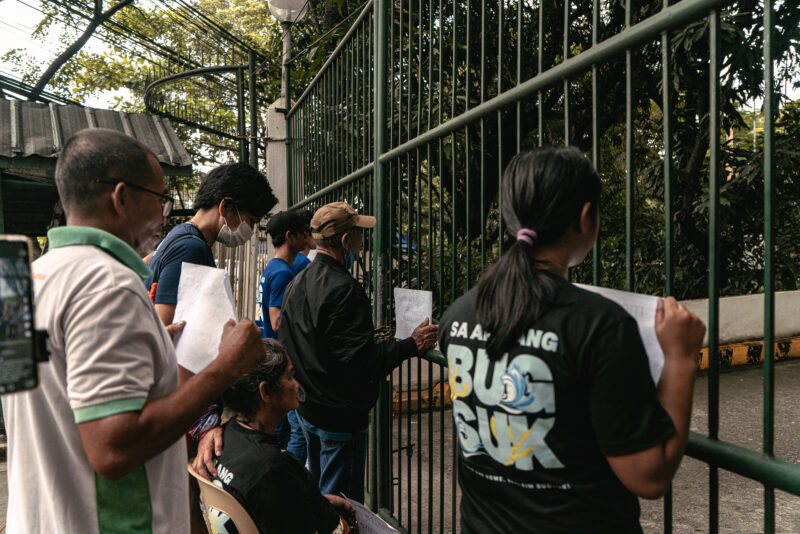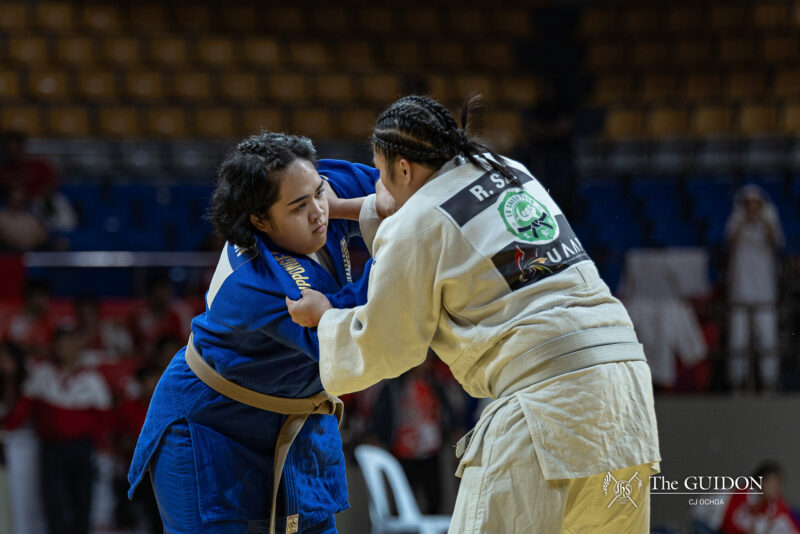You dust off a quick sign of the cross and say a last prayer. A deep breath later, you open the door, and you’re offered a seat. In front of you, a grave man sits, looking at you expectantly. On the table are simple pieces of paper—simple, yet with grave importance for you.
And those intimidating men who sit across from you on the other side of the table—what if you find out that one of them writes songs about falling in love and getting drunk? That other is practically Jack Black in School of Rock—using music to “stick it to the man?”
Ladies and gentlemen, composed of two Philosophy professors, an OSCI formator and the Associate Dean of Student Affairs (ADSA), presenting: Gene Pool.
Making the Band
The band, composed of Andrew Soh and PJ Strebel, both from the Philosophy Department, and Mr. Rene San Andres of ADSA, have an interesting story behind their scientific band name. “‘Gene Pool’ comes from the original composition of the band,” says Mr. Andrew Soh, rhythm guitarist. “I’m Chinese-Malaysian, PJ is Filipino-German, our original drummer was Dutch, and Rene calls himself the ‘native.’”
After experimenting with different names—“We used to be called Celestial Seasonings, because of a certain tea drink,” Mr. Soh shares—Mr. San Andres came up with the name. He noticed everyone’s differences—“PJ speaks German, and loves German culture, and Andrew, even when he talks, he speaks English like a Malaysian,” he says—and tried to express how they were a “confluence of different genes.”
These genes came together by chance. “A friend of mine from college used to have a band, and he found himself having a gig but with no band,” says bassist, Mr. Strebel. “So he told me that if I wanted to play, I could. So I [invited] some people with me, and it so happens that Andrew and Rene took up the offer. That very night, we said, why don’t we make ourselves into a band?” Thus, in Conspiracy Bar, Gene Pool was born.
Behind the music
Gene Pool began as an acoustic band that identified itself with folk guitars and soft songs, but had to adapt into a more aggressive, rock style. “The bands we were playing with were almost all rock bands, and we were beginning to be drowned out,” says lead guitarist, Mr. San Andres. For example, one of their songs, “Manalig” has an introduction reminiscent of Guns n’ Roses, with its assertive drumbeats and edgy guitar riffs. Mr. San Andres air-guitars this part before saying that it used to be a folk song.
This transition led to their sound today, a rollicking mix of rock and jazz that is original to them. “We very rarely do covers,” says Mr. Strebel, who prefers to write about what he calls the normal things in life: “falling in love, and getting drunk.”
Mr. Soh still finds it slightly strange playing in a rock band. “I grew up liking a lot of folk music, and acoustic guitar,” he says. Taught by a neighbor who loved Simon and Garfunkel and John Denver, he found the transition difficult. “I find it hard to adjust to rock music because as the rhythm guitar, you don’t always play the whole rhythm.” He grins sheepishly. “There are some songs that we’ve been playing for ages, and I still haven’t gotten the hang of them.”
Medium is the message
Songs and music don’t just come from nowhere. Generic boy band songs aside, there has to be some genuine motivation and inspiration that drives the creative juices. Much like their ethnic composition, these motivations vary among the three members of Gene Pool.
It seems that rebelliousness and angst are universal, even for Associate Deans. “Some of my early songs were about questioning authority,” says Mr. San Andres. He also wrote such church songs as “Paghahandog” and “Narito Ako.” “But now,” he says, “I find that I’m most prolific when I’m down, or emo.” He also says that music isn’t just for show or for listening pleasure. “There should be some message as well.”
It’s these feelings that allow people to write about all sorts of things, many times about matters of the heart. “I have written a lot of love songs, and not just the happy kind,” says Mr. Soh. “But sometimes I also write about simple things that make me happy, like looking at nature—the blueness of the sky, the greenness of the grass.”
And releasing these emotions by performing the songs is something all three of them love. “While it is a hobby for me, it is also very therapeutic,” says Mr. Strebel. “It’s a way of getting out of the regularity of the routine.”
Mr. Soh sees a relationship between being a rock star and his day job. “I love being on stage, performing,” he shares. He explains that teaching is also a performance. “I enjoy being able to transmit something, share something, to perform. In the classroom, you can have a brilliant mind, but be boring—you have to be a performer, to convey what you want to say.”
Undefined
It is still jarring to think that the purveyors of all this—the talk of emotions, guitar riffs and licks, and interesting band names are the same people who grill students during oral exams and who bust people for not wearing their IDs. “Some students, when they see me at gigs, just go ‘Sir!?’ (he mimes a student gaping in awe) and tell me to be more like that—more laid back during classes,” says Mr. Soh. “I’m serious while I teach; I always maintain a professional distance. So a lot of students are surprised.”
Mr. Strebel says that since they don’t advertise themselves, it’s always a surprise when students find out, usually during class events. “I used to hold Christmas parties for my class, and we’d play there,” he says with a grin. “They find the idea very exciting.”
Ironically, Mr. San Andres offers the most philosophical answer. “The thing that I hate about my job is that people put me in a box,” he says. “Because I’m ADSA, everyone sees me just as the tagahuli”
He sees himself as an educator, more than an academic, and that performing in a band helps him fulfill this function. “The more fulfilling part is about education, about facilitating the growth of a person,” he shares. “Music helps me remind myself and others that when it comes to education and growth, there’s more than the formalities.”

